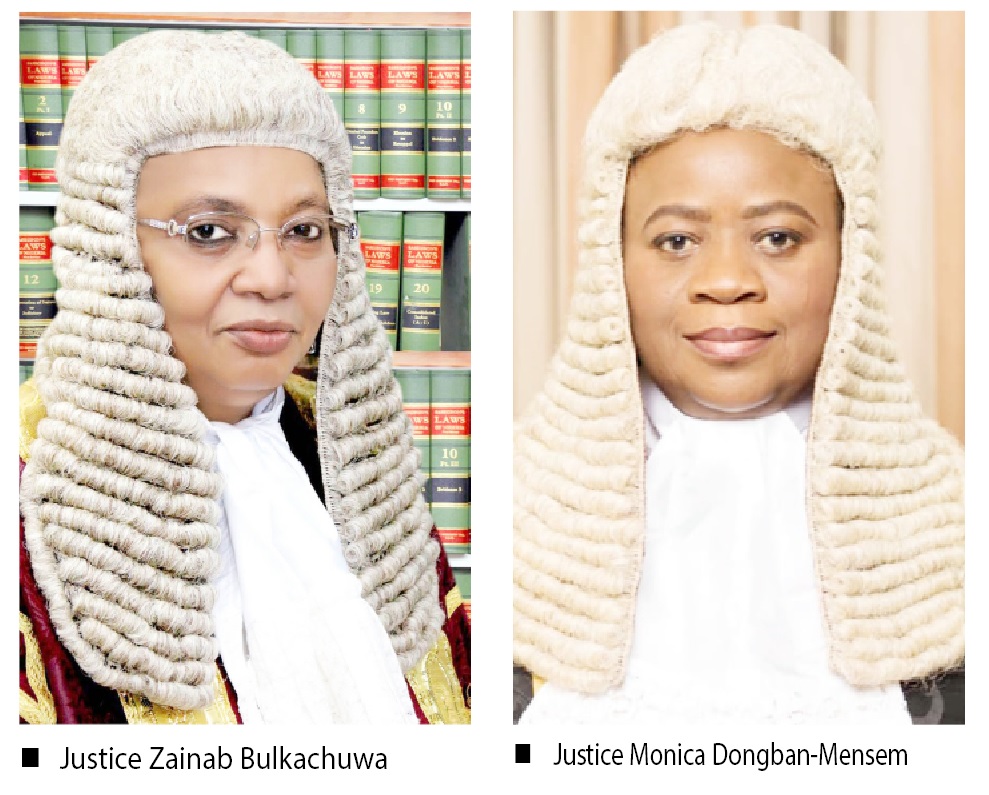As the succession race for the office of the President of the Court of Appeal (PCA) hots up, certain conditions are expected to influence the choice and selection process.
The incumbent PCA, Justice Zainab Bulkachuwa, will retire on March 6 after clocking the statutory 70 years of age. As part of ceremonies lined up for her retirement, valedictory sessions have been held in her honour in some divisions of the court across the country such as Enugu, Awka, Asaba, Yenagoa, Lagos, Kano and Yola among others.
Three justices are believed to be warming up to assume the vacant position. They are: Justices Monica Dongban-Mensem, Mohammed Garba, and Raphael Agbo.
Constitutional provisions
Section 238 (1) says: The appointment of a person to the office of President of the Court of Appeal shall be made by the President on the recommendation of the National Judicial Council subject to confirmation of such appointment by the Senate.
The section further provides in Sub-section 2 that, “The appointment of a person to the office of a Justice of the Court of Appeal shall be made by the President on the recommendation of the National Judicial Council.
“(3) A person shall not be qualified to hold the office of a Justice of the Court of Appeal unless he is qualified to practise as a legal practitioner in Nigeria and has been so qualified for a period of not less than twelve years.
“(4) If the office of the President of the Court of appeal is vacant, or if the person holding the office is for any reason unable to perform the functions of the office, then until a person has been appointed to and has assumed the functions of that office, or until the person holding the office has resumed those functions, the President shall appoint the most senior Justice of the Court of Appeal to perform those functions.
“(5) Except on the recommendation of the National Judicial Council, an appointment pursuant to the provisions of subsection (4) of this section shall cease to have effect after the expiration of three months from the date of such appointment, and the President shall not re-appoint a person whose appointment has lapsed.”
S/Court elevation controversy
Controversy brewed when President Muhammadu Buhari in June 2019 wrote the Chief Justice of Nigeria, Justice Tanko Muhammad, for the appointment of additional justices of the Supreme Court. A source conversant with issues in the race for appointment of a new PCA said when Justice Dogben-Mensem, who is next most senior justice, was contacted by the National Judicial Council (NJC) on her nomination for elevation to the Supreme Court, she declined the offer.
The source claimed the nomination would have paved the way for another senior justice to replace the outgoing PCA.
Although Justice Mensem, the Plateau State-born Head of Enugu Division of the court, was said to have declined the offer of elevation in preference of assuming the office of the PCA which would become vacant in few months’ time, rumours of her inclusion in the six-justices’ shortlist for the NJC interview, continued.
When the list of selected candidates eventually emerged it included Justices Adamu Jauro (North East); Emmanuel Agim (South South); Samuel Oseji (South South); and Helen Ogunwumiju (South West), who were all elevated to the apex court.
The source said Mensem was consulted to avoid a repeat of the former President of the Court of Appeal, Ayo Salami’s scenario when he rejected his elevation to the Supreme Court by the NJC.
The source alleged that plans were still on to flout the existing order of seniority in the judiciary which favours Justice Monica Dongben-Mensem as the second most senior judge after the PCA. The source pointed to how Justice Dongben-Mensem was sidelined for Justice Mohammed Garba, who is the third most senior judge of the court in the Presidential Election Petitions Tribunal after Justice Bulkachuwa recused herself on May 22, 2019.
“Normally, if you are appointed in acting capacity and there is nothing against you, you are supposed to be confirmed. But you know the judiciary has had it very rough under this administration. From invading of residences to Onnoghen’s removal and disregard of court orders. We do hope they will respect the tradition of seniority in the judiciary. That was how Justice Bulkachuwa was appointed,” he said.
But in his view, a law lecturer, Abdul Mohammed, said Section 238 of the Nigerian Constitution allows substantive appointment of the President of the Court of Appeal at the discretion of the president and the recommendation of the NJC. He said such an individual must have been a legal practitioner for 12 years.
He traced the case of Justice Bulkachuwa in March 2014 by then President Goodluck Jonathan, whose appointment, he said, was notwithstanding that her senior, Justice Dalhatu Adamu (late), who acted for six months was not confirmed to the office.
“It wasn’t that the post became vacant, she was appointed in acting until she was appointed substantively,” he said.
However, a senior official in the NJC told Daily Trust that no date has been fixed for the screening or the process for the appointment of new President of the Court of Appeal as provided in the constitution.

 Join Daily Trust WhatsApp Community For Quick Access To News and Happenings Around You.
Join Daily Trust WhatsApp Community For Quick Access To News and Happenings Around You.


